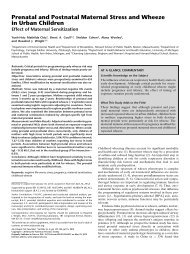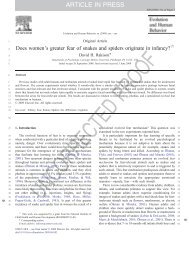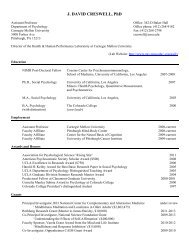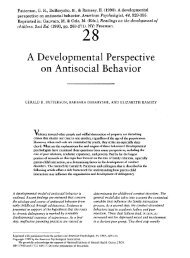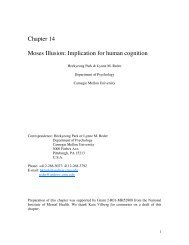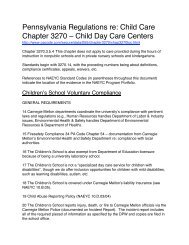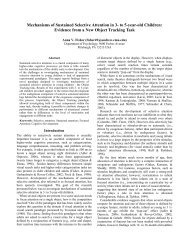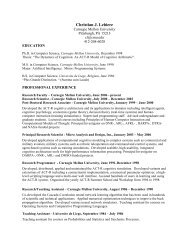Marsha C. Lovett - Psychology - Carnegie Mellon University
Marsha C. Lovett - Psychology - Carnegie Mellon University
Marsha C. Lovett - Psychology - Carnegie Mellon University
You also want an ePaper? Increase the reach of your titles
YUMPU automatically turns print PDFs into web optimized ePapers that Google loves.
<strong>Marsha</strong> C. <strong>Lovett</strong><br />
Department of <strong>Psychology</strong> and Phone: 412-268-3499<br />
Eberly Center for Teaching Excellence Fax: 412-268-5701<br />
<strong>Carnegie</strong> <strong>Mellon</strong> <strong>University</strong> Email: <strong>Lovett</strong>+@CMU.EDU<br />
EMPLOYMENT<br />
2009-present Associate Teaching Professor, <strong>Psychology</strong> Department, <strong>Carnegie</strong> <strong>Mellon</strong><br />
2004-present Associate Director, Eberly Center for Teaching Excellence<br />
2006-2009 Associate Research Professor, <strong>Psychology</strong> Department, <strong>Carnegie</strong> <strong>Mellon</strong><br />
2000-2006 Assistant Professor, <strong>Psychology</strong> Department, <strong>Carnegie</strong> <strong>Mellon</strong><br />
1996-2002 Research Associate, Center for Innovation in Learning, <strong>Carnegie</strong> <strong>Mellon</strong><br />
1994-2000 Postdoctoral Associate, <strong>Psychology</strong> Department, <strong>Carnegie</strong> <strong>Mellon</strong><br />
EDUCATION<br />
Ph.D. <strong>Carnegie</strong> <strong>Mellon</strong> <strong>University</strong>, Cognitive <strong>Psychology</strong>, 1994<br />
M.S. <strong>Carnegie</strong> <strong>Mellon</strong> <strong>University</strong>, Cognitive <strong>Psychology</strong>, 1991<br />
B.A. Princeton <strong>University</strong>, Cognitive Science, Summa Cum Laude, 1989<br />
PROFESSIONAL SERVICE<br />
Executive Committee Liaison to Pittsburgh Science of Learning Center (PSLC)<br />
Steering Committees Program in Interdisciplinary Educational Research (PIER)<br />
Advisory Boards Consortium for the Advancement of Undergraduate Statistics<br />
Education (CAUSE); Concepts of Statistical Inference Curriculum<br />
Editorial Board Journal of Experimental <strong>Psychology</strong>: Learning, Memory, and<br />
Cognition (2006-2008); Review of Educational Research (2008present)<br />
Grant Reviewer National Science Foundation; AFOSR<br />
Manuscript Reviewer Cognitive Science; Journal of Experimental <strong>Psychology</strong>: General;<br />
Journal of Experimental <strong>Psychology</strong>: Learning, Memory, and<br />
Cognition; Human Factors; Memory and Cognition; Psychonomic<br />
Bulletin & Review; Thinking and Reasoning; Journal of Statistics<br />
Education; Perception; Review of Educational Research<br />
Conference Organizer 33 rd <strong>Carnegie</strong> Symposium on Cognition: Thinking with Data (2004)<br />
6 th International Conference on Cognitive Modeling (2004)<br />
RESEARCH GRANTS<br />
2008-2010 “Improving the Feedback Cycle in Introductory Courses”<br />
Spencer Foundation, $470,000, Co-Principal Investigator<br />
2008-2010 “Cognitive Robotics: An Innovative Undergraduate Curriculum”<br />
National Science Foundation, $400,000, Co-Principal Investigator<br />
2007-2009 “Matter & Interactions: Investigating and Improving the Course”<br />
National Science Foundation, $300,000, Co-Principal Investigator<br />
2005-2008 “Optimal Training System, Phase II”<br />
National Science Foundation, $250,000, Principal Investigator<br />
2004-2005 “Optimal Training System”<br />
National Science Foundation, $125,000, Principal Investigator<br />
1
2002-2005 “Developing Online Courses for an Open-Courseware Initiative,”<br />
William & Flora Hewlett Foundation, $1.9M, Investigator<br />
2002-2005 “Predicting Individual Performance in Complex Environments,”<br />
Office of Naval Research, $598K, Principal Investigator<br />
2001-2002 “The Generation and Refinement of Problem-Solving Strategies,”<br />
Berkman Faculty Development Fund, $2250, Principal Investigator<br />
2000-2004 “Dynamic Scaffolding to Improve Learning and Transfer of Hidden Skills,”<br />
National Science Foundation, $660K, Principal Investigator<br />
2000-2003 “Modeling Individual Differences in Working Memory and Strategy Adaptivity,”<br />
National Science Foundation, $90K, Co-Principal Investigator<br />
2000-2002 “Redesigning Introductory Statistics with a An Intelligent Cognitive Tutor,”<br />
PEW Foundation, $200K, Co-Principal Investigator<br />
1997-2001 “A Next-Generation Learning Environment for Statistical Reasoning,”<br />
National Science Foundation, $690K, Principal Investigator<br />
1997-2001 “A Training Program in Cross-Disciplinary Research and Training,”<br />
National Science Foundation, $600K, Investigator<br />
CONFERENCE/SYMPOSIUM-RELATED GRANTS<br />
2003-2004 33 rd <strong>Carnegie</strong> Symposium on Cognition: Thinking with Data,”<br />
National Science Foundation, $37K, Principal Investigator<br />
2003-2004 “Thinking with Data Symposium,”<br />
Office of Naval Research, $10K, Principal Investigator<br />
2003-2004 “Thinking with Data: Education, Development, & Practice,”<br />
National Institute of Child Health and Human Development, $5K, Principal Investigator<br />
2003-2004 “Sixth International Conference on Cognitive Modeling,”<br />
Army Research Lab, $10K, Principal Investigator<br />
2003-2004 “Sixth International Conference on Cognitive Modeling,”<br />
Air Force Office of Scientific Research, $5K, Principal Investigator<br />
2003-2004 “Sixth International Conference on Cognitive Modeling,”<br />
Air Force Research Laboratory, $5K, Principal Investigator<br />
2003-2004 “Sixth International Conference on Cognitive Modeling,”<br />
Office of Naval Research, $10K, Principal Investigator<br />
2003-2004 “Sixth International Conference on Cognitive Modeling,”<br />
National Science Foundation, $10K, Principal Investigator<br />
HONORS and AWARDS<br />
2001 Outstanding Professor Award, National Society of Collegiate Scholars<br />
1991 Visiting Scholar, <strong>University</strong> of California, Berkeley<br />
1989-1992 National Science Foundation Graduate Research Fellowship<br />
1989 George A. Miller Award for outstanding student in Cognitive Science<br />
1989 Inducted into Phi Beta Kappa<br />
1988 George Wood Prize for highest academic record, Princeton <strong>University</strong><br />
2
REFEREED PUBLICATIONS<br />
Rosenberg-Lee, M., <strong>Lovett</strong>, M. C., & Anderson, J. R. (2009). Neural correlates of arithmetic calculation<br />
strategies. Cognitive, Affective, & Behavioral Neuroscience, 9, 270-285.<br />
<strong>Lovett</strong>, M. C., Meyer, O., & Thille, C. (2008). Open Learning Initiative: Testing the accelerated learning<br />
hypothesis in Statistics. Journal of Interactive Media in Eduction. [special issue printing top papers from<br />
the OpenLearn Conference 2008]<br />
DiPietro, M., Norman, M., <strong>Lovett</strong>, M., et al. (2008). Purposeful consultations: A framework for<br />
balancing theory, tips, and time. To Improve the Academy.<br />
<strong>Lovett</strong>, M. C. (2005). A Strategy-Based Interpretation of Stroop. Cognitive Science, 29, 493-524.<br />
Nellen, S., & <strong>Lovett</strong>, M. C. (2004). Towards a theory of balancing exploration and exploitation in probabilistic<br />
environments. Proceedings of the 6 th International Conference on Cognitive Modeling, Mahway, New Jersey:<br />
Erlbaum.<br />
Chang, N., Koedinger, K, & <strong>Lovett</strong>, M. C. (2003). Learning spurious correlations instead of deeper relations.<br />
Proceedings of the 25 th Annual Conference of the Cognitive Science Society, Boston, MA: Cognitive Science<br />
Society.<br />
<strong>Lovett</strong>, M. C. (2002). Modeling selective attention: not just another model of Stroop. Cognitive Systems<br />
Research, 3, 67-76. [special issue printing top papers from International Conference on Cognitive Modeling]<br />
<strong>Lovett</strong>, M. C., & Meyer, O. (2002). Implementing a cognitive tutor in a statistical reasoning course:<br />
Getting the big picture. Proceedings of the Seventh International Conference on the Teaching of<br />
Statistics.<br />
Brown, J., & <strong>Lovett</strong>, M. (2001). The effects of reducing information on a modified prisoner's<br />
dilemma game. In J. D. Moore & K. Stenning (Eds.) Proceedings of the 23rd Annual Conference<br />
of the Cognitive Science Society (pp. 162-167). Mahwah, New Jersey: Erlbaum.<br />
Daily, L. Z., <strong>Lovett</strong>, M. C., & Reder, L. M. (2001). Modeling individual differences in working memory<br />
performance: A source activation account in ACT-R. Cognitive Science, 25, 315-353. [lead article]<br />
<strong>Lovett</strong>, M. C. (2001). Modeling selective attention: Not just another model of Stroop. In E. M.<br />
Altmann, A. Cleeremans, C. D. Schunn, & W. D. Gray (Eds.), Proceedings of the 2001 Fourth<br />
International Conference on Computational Modeling (pp. 151-156). Mahwah, NJ: Erlbaum.<br />
Schunn, C. D., <strong>Lovett</strong>, M. C., & Reder, L. M. (2001). Awareness and working memory in strategy adaptivity.<br />
Memory & Cognition, 29, 254-266.<br />
<strong>Lovett</strong>, M. C., Daily, L. Z., & Reder, L. M. (2000). A source activation theory of working memory:<br />
Cross-task prediction of performance in ACT-R. Cognitive Systems Research, 1, 99-118.<br />
<strong>Lovett</strong>, M. C., & Greenhouse, J. B. (2000). Applying cognitive theory to statistics instruction. The<br />
American Statistician, 54, 196-206.<br />
<strong>Lovett</strong>, M. C., & Schunn, C. D. (2000). The importance of frameworks for directing empirical<br />
questions: Reply to Goodie and Fantino (2000). Journal of Experimental <strong>Psychology</strong>: General,<br />
129, 453-456.<br />
<strong>Lovett</strong>, M. C., & Schunn, C. D. (1999). Task representations, strategy variability, and<br />
base-rate neglect. Journal of Experimental <strong>Psychology</strong>: General, 128, 107-130. [lead article]<br />
Anderson, J. R., Lebiere, C., <strong>Lovett</strong>, M. C., & Reder, L. R. (1998). ACT-R: A higher-level account of<br />
processing capacity. Behavioral and Brain Sciences, 21, 831-832.<br />
[Commentary on Halford, G., Wilson, W., & Phillips, S. (1998). Processing capacity defined by<br />
relational complexity: Implications for comparative, developmental and cognitive psychology.<br />
Behavioral and Brain Sciences, 21, 803-864.]<br />
Gluck, K. A., Shute, V. J., Anderson, J. R., & <strong>Lovett</strong>, M. C. (1998). Deconstructing a computerbased<br />
tutor: Striving for better learning efficiency in Stat Lady. In B. P. Goettl, H. M. Halff, C. L.<br />
Redfield, & V. J. Shute (Eds.) Intelligent Tutoring Systems, Lecture Notes in Computer Science<br />
Volume 1452. New York: Springer.<br />
<strong>Lovett</strong>, M. C. (1998). Cognitive task analysis in service of intelligent tutoring systems design: A<br />
case study in statistics. In B. P. Goettl, H. M. Halff, C. L. Redfield, & V. J. Shute (Eds.)<br />
Intelligent Tutoring Systems, Lecture Notes in Computer Science Volume 1452 pp. 234-243. New<br />
York: Springer.<br />
3
<strong>Lovett</strong>, M. C. (1997). Modeling individual differences in a digit working memory task. Proceedings<br />
of the Nineteenth Annual Conference of the Cognitive Science Society. pp. 460-465. Mahwah,<br />
NJ: Erlbaum.<br />
<strong>Lovett</strong>, M. C., & Anderson, J. R. (1996). History of success and current context in problem solving:<br />
Combined influences on operator selection. Cognitive <strong>Psychology</strong>, 31, 168-217.<br />
<strong>Lovett</strong>, M. C., & Anderson, J. R. (1995). Making heads or tails out of selecting problem-solving<br />
strategies. In J. D. Moore & J. F. Lehman (Eds.) Proceedings of the Seventeenth Annual<br />
Conference of the Cognitive Science Society, pp. 265-270. Hillsdale, NJ: Erlbaum.<br />
<strong>Lovett</strong>, M. C., & Anderson, J. R. (1994). Effects of solving related proofs on memory and transfer in<br />
geometry problem solving. Journal of Experimental <strong>Psychology</strong>: Learning, Memory, and<br />
Cognition, 20(2), 366-378.<br />
<strong>Lovett</strong>, M. C. (1992). Learning by problem solving versus by examples: The benefits of generating<br />
and receiving information. Proceedings of the Fourteenth Annual Conference of the Cognitive<br />
Science Society. pp. 956-961. Hillsdale, NJ: Erlbaum.<br />
Hickman, A. K., & <strong>Lovett</strong>, M. C. (1991). Partial match and search control via internal analogy.<br />
Proceedings of the Thirteenth Annual Conference of the Cognitive Science Society. Hillsdale, NJ:<br />
Erlbaum.<br />
OTHER ARTICLES<br />
<strong>Lovett</strong>, M. C., Meyer, O., & Thille, C. (2010). In search of the “perfect” blend between an instructor<br />
and an online course for teaching introductory statistics. Proceedings of the Eighth International<br />
Conference on the Teaching of Statistics.<br />
<strong>Lovett</strong>, M. C. (2003). Problem Solving. In L. Nadel (Ed.), Encyclopedia of the Cognitive Sciences.<br />
London: Macmillan.<br />
<strong>Lovett</strong>, M. C. (2002). Problem Solving. In H. Pashler, & D. Medin (Eds.) Stevens’ Handbook of<br />
Experimental <strong>Psychology</strong>. Volume 2: Memory and Cognitive Processes (pp. 317-362). New<br />
York: Wiley.<br />
<strong>Lovett</strong>, M. C. (2001). Cognitive theory, ACT. To appear in The International Encyclopedia of the<br />
Social and Behavioral Sciences. The Netherlands: Elsevier.<br />
<strong>Lovett</strong>, M. C. (1998). A review of ‘Instructional Design: International Perspectives. Volume 1:<br />
Theory, Research and Models’. Journal of Educational Computing Research, 18, 197-202.<br />
<strong>Lovett</strong>, M. C. (1996). Are the new methods better?: A cognitive psychologist’s view on evaluating<br />
methods for teaching statistics. In Proceedings of the Joint Statistical Meetings, Section on<br />
Education. American Statistical Association: Reston, VA.<br />
BOOKS AND EDITED PROCEEDINGS<br />
Ambrose, S. A., Bridges, M. W., DiPietro, M., <strong>Lovett</strong>, M. C., & Norman, M. K. (in press). How<br />
Learning Works: Seven Research-Based Principles for Smart Teaching. San Francisco, CA:<br />
Jossey-Bass.<br />
<strong>Lovett</strong>, M. C. & Shah, P. (2007) Thinking with Data: 33 rd <strong>Carnegie</strong> Symposium on Cognition.<br />
Mahwah, New Jersey: Erlbaum.<br />
<strong>Lovett</strong>, M. C., Schunn, C. D., Lebiere, C., & Munro, P. (2004) Proceedings of the Sixth International<br />
Conference on Cognitive Modeling, Mahwah, New Jersey: Erlbaum.<br />
BOOK CHAPTERS<br />
<strong>Lovett</strong>, M.C., & Chang, C. (2007). Data-analysis skills: What and how are students learning? In M.<br />
<strong>Lovett</strong>, & P. Shah (Eds.) Thinking with Data. Mahwah, NJ: Erlbaum.<br />
<strong>Lovett</strong>, M. C., & Anderson, J. R. (2005). Thinking as a production system. In K. Holyoak, and R.<br />
Morrison (Eds), The Cambridge Handbook on Thinking. Cambridge.<br />
<strong>Lovett</strong>, M. C. (2001). A Collaborative convergence on studying reasoning processes: A case study in<br />
statistics. In S. Carver, & D. Klahr (Eds.) Cognition and instruction: Twenty-five years of<br />
progress (pp. 347-384). Mahwah, NJ: Erlbaum.<br />
4
<strong>Lovett</strong>, M. C., Reder, L. M., & Lebiere, C. (1999). Modeling working memory in a unified<br />
architecture: An ACT-R perspective. In A. Miyake & P. Shah (Eds.) Models of Working<br />
Memory. pp. 135-182. Cambridge, MA: Cambridge.<br />
<strong>Lovett</strong>, M. C. (1998). Choice. In J. R. Anderson & C. Lebiere (Eds.) Atomic Components of<br />
Thought. Mahwah, NJ: Erlbaum.<br />
Anderson, J. R., Lebiere, C., & <strong>Lovett</strong>, M. C. (1998). Performance. In J. R. Anderson & C. Lebiere<br />
(Eds.) Atomic Components of Thought. Mahwah, NJ: Erlbaum.<br />
Reiser, B. J., Kimberg, D. Y., <strong>Lovett</strong>, M. C., & Ranney, M. (1992). Knowledge representation and<br />
explanation in GIL, an intelligent tutor for programming. In J. Larkin & R. Chabay (Eds.)<br />
Computer Assisted Instruction and Intelligent Tutoring Systems: Shared Goals and<br />
Complementary Approaches pp. 111-149. Hillsdale, NJ: Erlbaum.<br />
Reiser, B. J., Ranney, M., <strong>Lovett</strong>, M. C., & Kimberg, D. Y. (1989). Facilitating students' reasoning<br />
with causal explanations and visual representations. In D. Bierman, J. Breuker, & J. Sandberg<br />
(Eds.), Proceedings of the Fourth International Conference on Artificial Intelligence and<br />
Education. Springfield, VA: IOS.<br />
SELECTED CONFERENCE PRESENTATIONS & INVITED ADDRESSES (2010-2002)<br />
<strong>Lovett</strong>, M. C. (2010). Incorporating Visualizations and Computer Simulations into your Teaching.<br />
Consortium for the Advancement of Undergraduate Statistics Education, Jan, 2010, webinar.<br />
<strong>Lovett</strong>, M. C., & delMas, R. (2008). Setting the stage for students' conceptual change in statistics.<br />
Consortium for the Advancement of Undergraduate Statistics Education, June, 2008 webinar.<br />
<strong>Lovett</strong>, M. C. (2008). Teaching metacognition. Educause Learning Initiative, May, 2008 webinar.<br />
<strong>Lovett</strong>, M. C. (2008). Teaching metacognition. Teaching Excellence Mini-conference, Ohio State<br />
<strong>University</strong>. April, 2008.<br />
<strong>Lovett</strong>, M. C. (2008). How students learn. Open Learning Interplay Symposium. Pittsburgh, PA.<br />
March, 2008.<br />
<strong>Lovett</strong>, M. C. (2008). Teaching metacognition. Educause Annual Meeting, San Antonio, TX.<br />
(featured speaker) (January 2008).<br />
Thille, C., & <strong>Lovett</strong>, M. C. (2007). Measuring the effectiveness of the OLI statistics course in<br />
accelerating student learning. OpenLearn2007, London, England, December, 2007.<br />
<strong>Lovett</strong>, M. C. (2007). How students learn. Talk presented at California Polytechnic Institute at San<br />
Luis Obispo, December, 2007.<br />
Rosenberg-Lee, M., <strong>Lovett</strong>, M. C., & Anderson, J. R. (2007). Neural correlates of strategies: an fMRI<br />
study of multi-digit mental multiplication. In Society for Neuroscience Abstracts, 33. San Diego,<br />
CA, November 2007.<br />
Bridges, M., Norman, M., <strong>Lovett</strong>, M. C., et al. (2007). Purposeful consultations: A framework for<br />
balancing theory, tips and time. 32 nd Annual Conference of the Professional and Organizational<br />
Development Network in Higher Education, Pittsburgh, PA, October, 2007.<br />
<strong>Lovett</strong>, M. C., & DiPietro, M. (2007). Innovative pedagogies to engage students and enhance<br />
learning. Talk presented at CCAC. Pittsburgh, PA, June, 2007.<br />
<strong>Lovett</strong>, M. C. (2007). Understanding and evaluating educational research methods. Talk presented at<br />
CCAC. Pittsburgh, PA, June, 2007.<br />
Rosenberg-Lee, M., & <strong>Lovett</strong>, M. C. (2006). Does Practice and Knowledge Equal Knowledge and<br />
Practice? Poster presented the 28th Annual Meeting of the Cognitive Science Society, Vancouver,<br />
Canada, July 2006.<br />
Rosenberg-Lee, M., & <strong>Lovett</strong>, M. C. (2005). Procedural Practice in Complex Domains, Classroom<br />
and Laboratory Perspectives. Poster presented at the 11th Biennial Meeting of the European<br />
Association for Research on Learning and Instruction, Nicosia, Cyprus August 2005.<br />
<strong>Lovett</strong>, M. C., & Reder, L. M., Lebiere, C., & Rehling, J. Predicting and explaining individual<br />
performance in a complex, dynamic task. ONR grantee meeting, Pittsburgh, June, 2005.<br />
<strong>Lovett</strong>, M. C. Strategy choice across the continuum. <strong>University</strong> of Florida, Gainesville, Florida,<br />
February, 2005.<br />
5
<strong>Lovett</strong>, M. C. & Chang, N. Data-analysis skills: What and how are students learning? Presented at<br />
the 33 rd <strong>Carnegie</strong> Symposium on Cognition: Thinking with Data, June 2004.<br />
<strong>Lovett</strong>, M. C. Taking our models seriously: Applying cognitive science to statistics instruction.<br />
Invited address, The Anderson Center for Innovation in Undergraduate Education, Rensselaer<br />
Polytechnic Institute, May, 2004.<br />
Nellen, S., & <strong>Lovett</strong>, M. C. Towards a theory of balancing exploration and exploitation in<br />
probabilistic environments. Sixth International Conference on Cognitive Modeling, Pittsburgh,<br />
August, 2004.<br />
<strong>Lovett</strong>, M. C., Lebiere, C., Reder, L., Demiral, B. Predicting performance in complex tasks. ONR<br />
workshop, Pittsburgh, November, 2003.<br />
Rehling, J., <strong>Lovett</strong>, M. C., et al. Estimating working memory to predict across-task performance. 5 th<br />
International Conference on Cognitive Modeling, Bamberg, Germany, April, 2003.<br />
<strong>Lovett</strong>, M. C. Where do problem-solving strategies come from? 24 th Annual Conference of the<br />
Cognitive Science Society, Fairfax, VA, August, 2002.<br />
Greenhouse, J. B, & <strong>Lovett</strong>, M. C., & Meyer, O. Practice, practice, practice: Applying cognitive<br />
theory to statistics instruction. Joint Statistical Meetings, New York, NY, August, 2002.<br />
Meyer, O., & <strong>Lovett</strong>, M. C. Implementing a computerized tutor in a statistical reasoning course:<br />
Getting the big picture. Joint Statistical Meetings, New York, NY, August, 2002.<br />
<strong>Lovett</strong>, M. C. , & Meyer, O. Implementing a cognitive tutor for introductory statistics. <strong>University</strong> of<br />
Massachusetts at Amherst, Amherst, MA, July, 2002.<br />
<strong>Lovett</strong>, M. C., Lebiere, C., & Reder, L. M. Evidence for a single working memory resource pool.<br />
Quebec '02 Conference on Working Memory, Quebec City, Quebec, July, 2002.<br />
<strong>Lovett</strong>, M. C. Studying (and improving!) how students learn statistics. PEW Workshop, Pittsburgh,<br />
PA, June, 2002.<br />
<strong>Lovett</strong>, M. C. Taking cognitive models seriously. Naval Research Laboratory, Arlington, VA, March,<br />
2002.<br />
6



